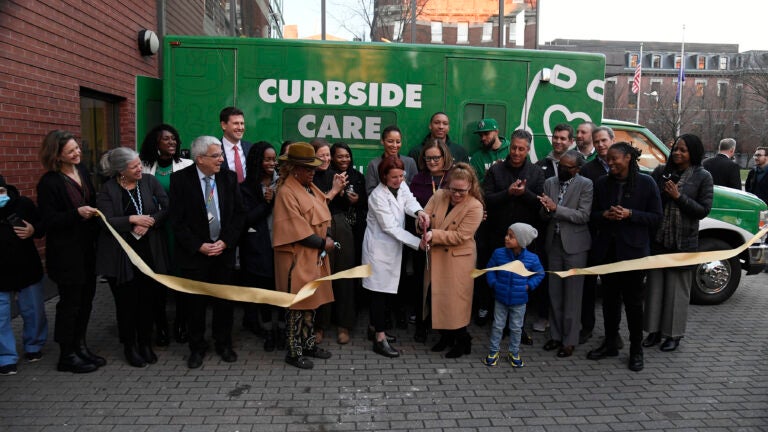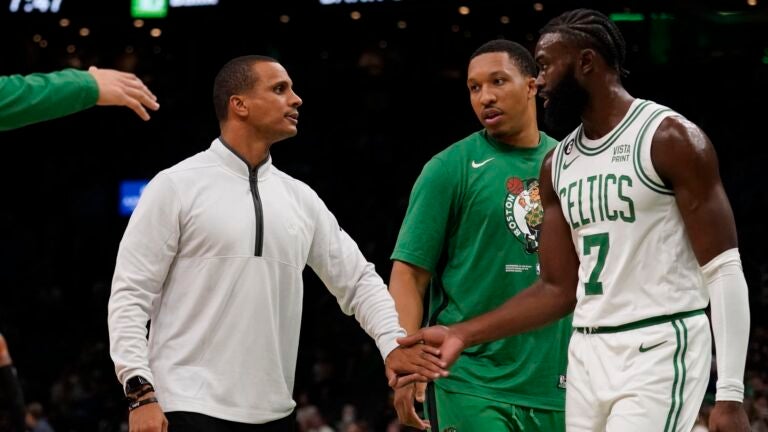Celtics
Through the Curbside Care initiative, patients can receive care right outside their front door.

Members of the Celtics organization pose with the new mobile healthcare unit. Celtics courtesy photo
-

‘Our society needs to do better’: Jaylen Brown, Joe Mazzulla share their thoughts on Tyre Nichols’ death
-
Tire Nichols case revives calls for change in police culture
After a baby is born, there are still plenty of hospital visits that both the child and mother are expected to attend.
According to Dr. Melissa Nass of Boston Medical Center, babies are supposed to be seen by a doctor within 48 hours of birth, followed by several other visits including a weight-check visit, a jaundice visit, and a one-month checkup.
For some patients, just getting back and forth to the hospital that many times can be an issue depending on access to transportation and child care. Even well-resourced patients say that’s a big ask, Nass said.
Aiming to improve access to comprehensive healthcare for moms and babies during the first six weeks, Boston Medical Center has partnered with Celtics United – the social justice arm of the Celtics’ Shamrock Foundation – on an initiative called Curbside Care.
Instead of having to all those trips to the hospital, patients in the Curbside Care program will receive care in an ambulance, wrapped in the Celtics’ green-and-white colors, that stops right in front of their homes.
“It’s a big box ambulance,” Nass said. “The kind that you would see on the highway, that has been converted into a clinic. We can do all the same things you could do if you came in to see the doctor at the clinic.”
Through conversations with players and community leaders, Celtics United identified six pillars to focus on when it was formed in the aftermath of George Floyd’s murder. One of the pillars is equity in healthcare.
Celtics senior vice president of ticket sales Mackenzie Henderson is a co-lead on the Celtics United equity in healthcare committee. She said those conversations led the committee to focus on access to health care.
“It’s where they access it,” Henderson said. “It’s how they access it, and then to get even more specific, we zeroed in on black and brown maternal health because the statistics would take your breath away. Black women in Massachusetts are nearly twice as likely to die from pregnancy-related causes than white women. In Boston alone, Black infant mortality is four times that of white infants.”
According to the Celtics, the mobile care unit will be fully funded for three years and will provide up to 2,100 patient visits a year.
There will be a nurse practitioner and a certified nurse midwife on board the unit so that the child and mother can be seen at the same time.
“And this is important too,” Nass said. “Because what happens in traditional models of care there’s a lot of fragmentation. The baby gets seen in pediatrics, the mom gets seen in obstetrics. That’s multiple trips to the hospital. In this model, they’re seen together and there’s good communication.”
There was a ribbon-cutting ceremony for the mobile unit on Jan. 18. Derrick White and Grant Williams were there to celebrate and interact with patients.
“The Shamrock Foundation has been a fabulous partner in this,” Nass said. “They get it. They’re not healthcare providers, but they’ve listened to the experience and expertise of healthcare providers and they’re just totally on board. The show of support has been incredible.”
Sign up for Celtics updates🏀
Get breaking news and analysis delivered to your inbox during basketball season.